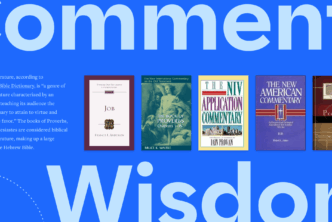In this excerpt from the May/June 2019 edition of Bible Study Magazine, Bronwyn Lea shares why author and Bible study teacher Jen Wilkin refuses to leave biblical literacy to the experts—and why she’s passionate about teaching others how to study the Bible.
***
By the time she was in college, Jen Wilkin had experienced church life in seven denominations, each with its own distinctive approach to reading the Bible. One church she attended during elementary school held a Bible study where the teachers “treated us as capable of learning and understanding the Scriptures, and then gave us tools to do so.” This early investment in showing kids how to study the Bible for themselves changed everything for Wilkin. “Hearing different pastors teach the same passages in such different ways had been an eye-opener,” she says. “It pushed me to want firsthand knowledge of the text.”
By her twenties, Wilkin understood it was possible to drown in waves of opinion. If she was going to learn to swim, she would have to learn to read the Bible for herself.
Deepening our knowledge
That early flame of passion for engaging directly with God’s word continues to fuel Wilkin’s prolific teaching and writing ministry, based in Flower Mound, Texas, and The Village Church. Her spoken and written words over the years continue to encourage believers of all ages and from all backgrounds to actively engage with the Bible for themselves.
Wilkin flatly rejects the notion that deep knowledge of Scripture is best left to adults and “experts.” “A child who is capable of reading is capable of reading the Bible,” she insists. “Children need early exposure to the Scriptures because they need to see them as a familiar friend. Reading the Scriptures to them—and then, of course, having them read them themselves—are all formative practices. Sometimes we think children should only read (the Bible) if they can understand everything they’re reading,” she says, but “we underestimate their ability.”
A child who is capable of reading is capable of reading the Bible. —Jen Wilkin Share on XThis is why Wilkin advocates for young students doing adult-type Bible study. “If high schoolers are capable of doing calculus and physics, they absolutely are capable of grappling with a line-by-line study of the Bible.”
Wilkin challenges herself in the same way, and she is no longer fazed by all that she doesn’t know or understand as a teacher. She began teaching the Bible as a 30-year-old, simply because there was no other teacher.
“I was a solid 10 years younger than the youngest class member,” she remembers, “and I lacked both life experience and teaching experience. I agreed to a temporary commitment and ended up teaching the class weekly for seven years. That precious group of women allowed me to learn alongside them. I learned teaching skills, empathy for my listeners, and frankly, I learned the Bible right along with them each week. By giving me a place to grow, they served me as much as I served them.”
“Understanding that I could teach and learn simultaneously—that I could pass on what I was in the process of learning—was very freeing for me,” Wilkin says. “We don’t see ourselves as experts, but as co-learners, and then we start doing the work.”
This growth mindset is something she models and encourages for every Christian. “It’s absolutely OK to say ‘this makes me uncomfortable and I don’t know the answer,’” she says. But that should not stop us from leaning into the discomfort and learning how to ask better questions of the text. We dare not make a lifestyle habit of deferring to others’ opinions, Wilkin says, for “one day we will stand before God and give an account of how well we loved him—which the great commandment says includes how we loved him with our minds. We won’t be giving an account for how well our pastors and teachers loved God with their minds.”
Why biblical literacy is crucial
Rather than striving to supply all the answers, Wilkin focuses her energy on building the church’s capacity and confidence in handling the biblical text. “We need to train people not just in how to apply the Scriptures, but also in what they actually say,” she says. We can’t build biblical literacy—that is, knowing what the Bible is about and how to interpret it—without building Bible literacy, in the sense of knowing what the text really says.
Wilkin provides an example from her own life. Early in her Christian faith, she had been taught that when Job says “what I feared has come upon me” (Job 3:25) he was giving permission for suffering to come. The practical conclusion she drew was that she should never speak of her fears out loud because that would give them power. However, when she started to read Job for herself, the text made it clear that “permission for those things to happen had been granted by God for a greater purpose” (Job 1:8–12). Scripture actually evoked compassion rather than condemnation for Job’s fears. “His fears were so ubiquitous, and so common to the human experience, that the poor interpretation lost all its power,” Wilkin explains.
Knowing what the text plainly said about Job (Bible literacy) made a world of difference in helping her evaluate what other people were claiming about the text (biblical literacy).
Biblical literacy: ‘nourishing our faith’
Wilkin wants to put the ingredients for Bible literacy in every believer’s hands. If our spiritual nourishment depends on our biblical “diet,” Wilkin sees her ministry as teaching people to “develop healthy eating habits.” Topical studies, like pre-prepared meals, can have a place in our spiritual diet, but there is no substitute for a deep knowledge of nutritious whole foods.
“Not everyone has the gift of teaching,” Wilkin says, “but we’re all responsible for being active learners.” She knows the learning curve can seem impossibly steep, but “this is where the typical student needs a little bit of permission and a little bit of a nudge.” For Christians who want to be faithful to God’s word, refusing to learn isn’t an option.
Not everyone has the gift of teaching, but we’re all responsible for being active learners. —Jen Wilkin Share on XWilkin believes an increase in Bible literacy will lead believers into deeper humility, as being immersed in Scripture shapes not just the content of our faith but the tone of our conversation. “One of the misconceptions we have is thinking that if we knew the Bible better, we would all reach consensus on what it means—and I don’t actually believe that would be the result.” Instead, she says, “what would become much clearer for us are our Christian essentials—the things that point us toward orthodoxy. Those are the things that believers who have spent time in the Scriptures over the last 2,000 years have rallied around. There might be things we disagree on in interpretation, but the essentials become clearer. That’s how we begin to say, “this is what makes a person a Christian versus not a Christian.”
However, not all things are essentials; some are matters of conviction or preference. “We have convictions, such as beliefs about how we baptize. Should we baptize infants or professing believers? People hold these views very deeply and may fight over them quite a bit, but they don’t threaten orthodoxy,” Wilkin says. “And then we have the third level of preferences, such as how worship is conducted in a gathering. We might argue over these things, but we wouldn’t break fellowship over them.” Such conflicts are products of how we read the Scriptures, and we will never agree on them all, she says, “but the closer we get to the text, the more we’ll move toward agreement on the things that matter most—and the more we’ll deal charitably with one another on the other matters of conviction and preference, too.”
Unity in the Church—a natural byproduct
Wilkin believes that growth in Bible study can help foster unity in the church. “One of the reasons we see such a lack of graciousness right now among believers is related to Bible literacy. We’re arguing other people’s opinions,” she says. “But I find that once we actually get into the weeds of looking at passages that have been used to prove a particular point, I often become less dogmatic about a position than I was beforehand. I may still see my position as valid, but I’m going to argue it with more of an open hand.”
Just as water helps the earth produce “bread for the eater,” God’s word, generously sown, will accomplish his purposes (Isa 55:10–11). Wilkin longs for people to be deeply nourished by the Scriptures. The feast is there for the taking; all we need is a little bit of permission and a little bit of a nudge.
***
Learn tips for how to study the Bible, or explore these articles and resources focused on increasing biblical literacy.
Related articles
- Got Big Bible Study Goals? Here’s Your Secret Weapon to Reach Them
- Why In-Depth Bible Study Doesn’t Have to Be Hard
- 4 Ways to Breathe New Life into Bible Study
- Distilled, Not Diluted: How She Reads Truth Uses Logos to Build Rich and Accessible Bible Reading Plans
Related resources
- Ten Words to Live By: Delighting in and Doing What God Commands – Jen Wilkin
- Women of the Word: How to Study the Bible with Both Our Hearts and Our Minds (audio) – Jen Wilkin
- Inductive Bible Study: A Comprehensive Guide to the Practice of Hermeneutics – David R. Bauer
- Lexham Press Bible Study Essentials Bundle
- How to Study Your Bible: Discover the Life-Changing Approach to God’s Word – by Kay Arthur
- Study the Bible with Logos (Course)
This article originally appeared in the May/June 2019 edition of Bible Study Magazine. The titles and some subheads are the addition of an editor.







